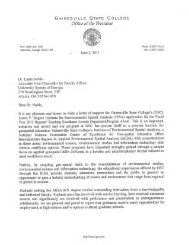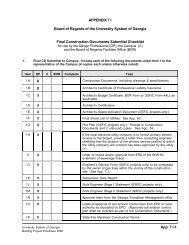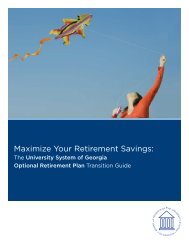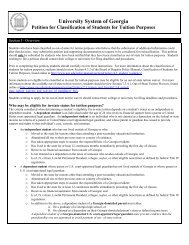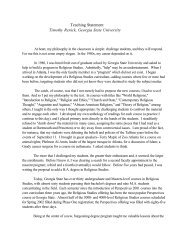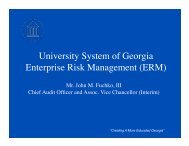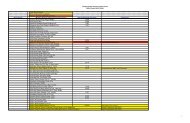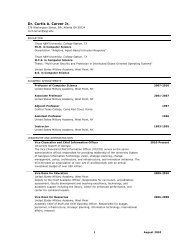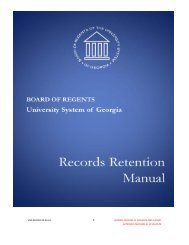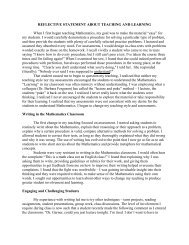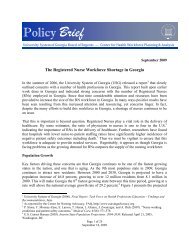66924 Federal Register / Vol. 75, No. 209 / Friday, October 29, 2010 / Rules and RegulationsWReier-Aviles on DSKGBLS3C1PROD with RULES2test must meet all applicable andfeasible standards for test constructionand validity provided in the 1999edition <strong>of</strong> the Standards for <strong>Education</strong>aland Psychological Testing’’).Discussion: As discussed in the 1999edition <strong>of</strong> the Standards, each standardshould be considered to determine itsapplicability to the test beingconstructed. There may be reasons whya particular standard cannot be adopted;for example, if the test in question isrelatively new, it may not be possible tohave sufficient data for a completeanalysis. As a result <strong>of</strong> the informationin the 1999 edition <strong>of</strong> the Standards, wehave made a change to the proposedlanguage in § 668.146(b)(6) to reflectthat tests must meet all applicablestandards. However, we do not believethat we should include all ‘‘feasible’’standards in the regulatory language.We believe that where a standard is notfeasible, it would also not be applicable,as provided in the example, thus theinclusion <strong>of</strong> the word ‘‘feasible’’ isduplicative.Changes: We have revised§ 668.146(b)(6) by eliminating outdatedreferences to primary, secondary andconditional standards to make theprovision consistent with the languageused in the most recent edition <strong>of</strong> theStandards.Additional Criteria for the Approval <strong>of</strong>Certain Tests (§ 668.148)Comment: One commenter indicatedthat their program <strong>of</strong> instruction istaught in Spanish to non-Englishspeakers with an English as a SecondLanguage (ESL) component. Thecommenter asked the <strong>Department</strong> forguidance for populations where there isno approved ATB test in the nativelanguage <strong>of</strong> the students.Discussion: Under § 668.148, if aprogram is taught in a foreign language,a test in that foreign language wouldneed to satisfy the conditions forapproval under §§ 668.146 and 668.148.Absent an approved ATB test, studentswithout a high school diploma or itsequivalent could meet the alternativeunder proposed § 668.32(e)(5), wherebya student has been determined to havethe ability to benefit from the educationor training <strong>of</strong>fered by the institutionbased upon the satisfactory completion<strong>of</strong> 6 semester hours, 6 quarter hours, or225 clock hours that are applicabletoward a degree or certificate <strong>of</strong>fered bythat institution where the hours wereearned. If no test is reasonably availablefor students whose native language isnot English and who are not fluent inEnglish, institutions will no longer beable to use any test that has not beenpreviously rejected for approval by theSecretary. We proposed this regulatorychange because we recognized that, inthe last 15 years, no ATB test in aforeign language has been submitted forapproval. Therefore, under the currentATB regulations, any test in a foreignlanguage became an approved ATB testregardless <strong>of</strong> whether it measured basicverbal and quantitative skills andgeneral learned abilities, whether thepassing scores related to the passingscores <strong>of</strong> other recent high schoolgraduates, or whether these tests weredeveloped in accordance with the APAstandards. We believe that the removal<strong>of</strong> this overly broad exception from thecurrent regulations will improvecompliance and works in concert withthe change reflected in § 668.32(e)(5),which allows for an exception whereability to benefit can be measuredagainst a standard (the successfulearning <strong>of</strong> six credits toward a degree orcertificate program at that institution).Changes: None.Agreement Between the Secretary and aTest Publisher or a State (§ 668.150)Comment: Under proposed§ 668.150(b)(3)(ii), the agreementbetween the Secretary and a testpublisher or a State requires thatcertified test administrators have theability and facilities to keep ATB testssecure. One commenter stated that itdoes not favor storage <strong>of</strong> ATB testsanywhere other than at the institution.Another commenter <strong>of</strong>fered to workwith the <strong>Department</strong> and other testpublishers to develop guidelines thatwill improve ATB test security.Discussion: While ATB tests can beused for more than title IV, studenteligibility determination purposes (suchas for other assessment purposes),institutions, assessment center staff, aswell as, independent test administratorswill continue to have access to thesetests. Given this reality, weacknowledge that securing tests andpreventing test disclosure or release isdifficult. We established therequirement in § 668.150(b)(3)(ii) inorder to balance the need for legitimateaccess and security. We appreciate thecommenter’s <strong>of</strong>fer to work with the<strong>Department</strong> and other test publishers todevelop guidelines to improve testsecurity.Changes: None.Comment: One commenter supportedthe requirement in proposed§ 668.150(b)(3)(iii) that only allows testadministrators to be certified when theyhave not been decertified within the lastthree years by any test publisher. Thiscommenter inquired how, other thanthrough self-reporting, a test publisheror State would have the informationVerDate Mar2010 14:10 Oct 28, 2010 Jkt 223001 PO 00000 Frm 00094 Fmt 4701 Sfmt 4700 E:\FR\FM\29OCR2.SGM 29OCR2necessary to meet this requirement. Thecommenter also asked if we intend todevelop, implement, and maintain adatabase <strong>of</strong> decertified testadministrators.Discussion: Under proposed§ 668.144(c)(16) and (d)(7), a testpublisher and a State, respectively, mustdescribe its test administratorcertification process. The <strong>Department</strong>plans to evaluate each <strong>of</strong> the testpublisher’s or State’s certification plansto determine how they will obtain theinformation about test administratordecertifications by other test publishersor States. Under proposed§ 668.150(b)(2), each test administratorwill be required to provide to thepublisher or State, as appropriate, acertification statement to indicate thatthe test administrator is not currentlydecertified and that the testadministrator will notify the testpublisher or State immediately if anyother test publisher or State decertifiesthe test administrator. At this time, the<strong>Department</strong> does not plan to establish alist <strong>of</strong> all decertified test administrators.Changes: None.Comment: One commenter indicatedthat proposed § 668.150(b)(4), whichprovides that test administrators mustbe decertified under certaincircumstances, will require States andtest publishers to take great care whenanalyzing the facts prior to decertifyingany test administrator. Section668.150(b)(4) states that the agreementbetween the Secretary and a testpublisher or a State must require thedecertification <strong>of</strong> a test administratorwho (a) Fails to administer the test inaccordance with the test publisher’s orState’s requirements, (b) has not keptthe test secure, (c) has compromised theintegrity <strong>of</strong> the testing process, or (d)violated the test administrationrequirements in § 668.151.One commenter also expressedconcern that proposed § 668.150(b)(4)seems to remove the test publisher’s orState’s discretion about how to addresscertain violations <strong>of</strong> test administrationrules. That commenter asked whetherother corrective action is still a possibleoutcome, or whether decertification forany violation <strong>of</strong> the regulations or thetest publisher’s or State’s testadministration requirements is the onlypermissible outcome.Discussion: We understand thecomment regarding decertification <strong>of</strong>test administrators and that testpublishers and States will need to takecare when carrying out their obligationsunder these regulations. For example,we expect that a test publisher or Statewould provide an administrator anopportunity to respond to any finding
Federal Register / Vol. 75, No. 209 / Friday, October 29, 2010 / Rules and Regulations66925WReier-Aviles on DSKGBLS3C1PROD with RULES2warranting decertification, includingany finding based on inferences fromthe analysis required under§ 668.151(b)(13). Regarding the inquirywhether § 668.151(b)(4) removesdiscretion and requires decertificationwithout the possibility <strong>of</strong> othercorrective action, we note that Statesand publishers are required to establishappropriate test instructions that ensurethe integrity <strong>of</strong> the test and compliancewith the requirements <strong>of</strong> theregulations. Having established theappropriate instructions, we do expectStates and test publishers to decertifytest administrators that fail to follow thetest instructions or for any <strong>of</strong> the otherreasons specified in § 668.151(b)(4). Forexample, we expect a test publisher orState to decertify a test administratorwhenever it finds that a certified testadministrator—• Alters or falsifies answers or scores;• Provides a test-taker with answersto the ATB test in order to improve thetest-taker’s score; or• Allows a test-taker—other than atest-taker who is a person with adocumented disability—extra timebeyond the approved amount time asprovided by the test publisher or State.In situations where there is no evidenceor basis to conclude that one or more <strong>of</strong>the four reasons specified in§ 668.151(b)(4) has occurred, but thereare other irregularities <strong>of</strong> another orlesser nature, we would expect testpublishers and States to take theappropriate corrective action to protectthe proper administration <strong>of</strong> its ATBtest.Changes: None.Comment: Several commentersexpressed concern about § 668.150(b)(5),which requires the test publisher orState to reevaluate the qualifications <strong>of</strong>a test administrator who has beendecertified by another test publisher orState, even when the test publisher orState lacks any evidence <strong>of</strong> its own thatthe test administrator has performed ina manner inconsistent with therequirements in subpart J <strong>of</strong> part 668 oras required in the test administrationmanual.Discussion: Under § 668.150(b)(2), atest administrator is required to certifythat he or she is not currentlydecertified and, in the event he or shesubsequently is decertified, that he orshe will immediately notify all othertest publishers and States who haveprovided their certification. To theextent that a test administrator, who iscertified by test publishers A, B, and C,as well as States 1 and 2, is decertifiedby State 1, the test administrator isrequired to immediately notify the othertesting organizations and make themaware that the test administrator hasbeen decertified by State 1. Uponreceipt <strong>of</strong> such notification, under§ 668.150(b)(5), each <strong>of</strong> the other testpublishers and the other State willreevaluate the qualifications <strong>of</strong> that testadministrator. While the other testingorganizations may not know the factualbasis for the decertification by State 1,§ 668.150(b)(5) requires the other testingorganizations to examine this testadministrator’s work. Based upon thetesting organization’s analysis,additional pr<strong>of</strong>essional scrutiny, and thefacts as a result <strong>of</strong> their reevaluation, theother testing organizations must make adetermination <strong>of</strong> whether to continuethe test administrator’s certification orto decertify the test administrator forcause. The fact that a test administratorhas been decertified by one testingentity is sufficient cause to require thatall other test publishers or States bealerted both to the fact that there was aproblem <strong>of</strong> sufficient magnitude torequire decertification by the other testpublisher or State, and that they need tomake an additional review andsubsequent determination <strong>of</strong> whethertesting problems could be occurringwith the administration <strong>of</strong> their ATBtest.Changes: None.Comment: One commenterrecommended that we modify proposed§ 668.150(b)(5) to provide that testpublishers and States are not liable fordamages in the event a testadministrator is decertified wrongly.This commenter indicated thatproposed § 668.150(b)(6), whichrequires that the test publisher or Statenotify the Secretary and institutionsimmediately after decertifying a testadministrator, is overly broad and thattest publishers and States should be ableto end their relationship with a testadministrator for any reason.Discussion: We cannot indemnify testpublishers or States for actions that aformer employee may take against a testpublisher or State. This is one <strong>of</strong> thereasons it is so important to strengthenthese regulations including by requiringthat, as a part <strong>of</strong> the test developer’s (atest publisher or a State) submission, itdescribe in detail the test administratorcertification process—specifically howthe test developer will determine thatthe test administrator will have thetraining, knowledge, skills and integrityto administer the test consistent withthe regulations and the requirements asestablished by the test publisher or theState. Because the current regulationsalready require the decertification <strong>of</strong> testadministrators who fail to give the testin accordance with the test publisher’sVerDate Mar2010 14:10 Oct 28, 2010 Jkt 223001 PO 00000 Frm 00095 Fmt 4701 Sfmt 4700 E:\FR\FM\29OCR2.SGM 29OCR2instructions, who fail to secure the tests,who compromise the test, or whoviolate the provisions <strong>of</strong> § 668.151(Administration <strong>of</strong> tests), we do notanticipate that the changes to subpart J<strong>of</strong> part 668 reflected in these finalregulations will cause an increase inlegal actions brought by former testadministrators. However, we do expectthat these regulations will cause testpublishers and States to strengthen theirprocedures and training to ensure thatonly properly trained test administratorswill be certified by test publishers andStates.Notification <strong>of</strong> the Secretary andinstitutions when a test administrator isdecertified is required for a variety <strong>of</strong>compliance and other issues. TheSecretary needs to know to what extenta test publisher or State has a problemcausing the decertification <strong>of</strong> testadministrators. Recent GAO and OIGreports have reported a variety <strong>of</strong>compliance concerns around ATBtesting. The Secretary has aresponsibility to protect students,prospective students, institutions andtaxpayers. Through these requirements,one new compliance metric will be thenumber <strong>of</strong> decertifications by testpublishers or States, which theSecretary will monitor. Notification <strong>of</strong>any decertification by a test publisher orState to the institution is required dueto the fact that institutions depend onthe test publisher or State to providecertified test administrators and,therefore, are completely reliant upontest publishers and States to notify theinstitution <strong>of</strong> when a test administratoris no longer certified and must not beadministering tests to students for titleIV, HEA student eligibilitydetermination purposes.Changes: None.Comment: One commenter suggestedthat when a test publisher or Statesuspends a test administrator while itconducts an investigation into apossible violation <strong>of</strong> its requirements orthe regulations, the test publisher orState should not have to immediatelyreport the suspension to the Secretaryand the institution. The commenter alsosuggested that there should be a timelimit after which notification by the testpublisher or State to the Secretary andthe institutions would not be required.Discussion: Proposed § 668.150(b)(6)requires the immediate notification <strong>of</strong>the Secretary and all institutions wherethe test administrator administered testsupon decertification. We assume that incases <strong>of</strong> suspected test administratorviolations, a suspension period willoccur while fact-finding, analysis, andultimately a determination will be madeto either continue the test
- Page 1 and 2:
Friday,October 29, 2010Part IIDepar
- Page 3 and 4:
Federal Register / Vol. 75, No. 209
- Page 6 and 7:
66836 Federal Register / Vol. 75, N
- Page 8 and 9:
66838 Federal Register / Vol. 75, N
- Page 10 and 11:
WReier-Aviles on DSKGBLS3C1PROD wit
- Page 12 and 13:
66842 Federal Register / Vol. 75, N
- Page 14 and 15:
66844 Federal Register / Vol. 75, N
- Page 16 and 17:
WReier-Aviles on DSKGBLS3C1PROD wit
- Page 18 and 19:
66848 Federal Register / Vol. 75, N
- Page 20 and 21:
66850 Federal Register / Vol. 75, N
- Page 22 and 23:
WReier-Aviles on DSKGBLS3C1PROD wit
- Page 24 and 25:
66854 Federal Register / Vol. 75, N
- Page 26 and 27:
WReier-Aviles on DSKGBLS3C1PROD wit
- Page 28 and 29:
66858 Federal Register / Vol. 75, N
- Page 30 and 31:
66860 Federal Register / Vol. 75, N
- Page 32 and 33:
66862 Federal Register / Vol. 75, N
- Page 34 and 35:
66864 Federal Register / Vol. 75, N
- Page 36 and 37:
66866 Federal Register / Vol. 75, N
- Page 38 and 39:
WReier-Aviles on DSKGBLS3C1PROD wit
- Page 40 and 41:
WReier-Aviles on DSKGBLS3C1PROD wit
- Page 42 and 43:
66872 Federal Register / Vol. 75, N
- Page 44 and 45: WReier-Aviles on DSKGBLS3C1PROD wit
- Page 46 and 47: WReier-Aviles on DSKGBLS3C1PROD wit
- Page 48 and 49: WReier-Aviles on DSKGBLS3C1PROD wit
- Page 50 and 51: 66880 Federal Register / Vol. 75, N
- Page 52 and 53: WReier-Aviles on DSKGBLS3C1PROD wit
- Page 54 and 55: 66884 Federal Register / Vol. 75, N
- Page 56 and 57: 66886 Federal Register / Vol. 75, N
- Page 58 and 59: WReier-Aviles on DSKGBLS3C1PROD wit
- Page 60 and 61: WReier-Aviles on DSKGBLS3C1PROD wit
- Page 62 and 63: WReier-Aviles on DSKGBLS3C1PROD wit
- Page 64 and 65: WReier-Aviles on DSKGBLS3C1PROD wit
- Page 66 and 67: WReier-Aviles on DSKGBLS3C1PROD wit
- Page 68 and 69: WReier-Aviles on DSKGBLS3C1PROD wit
- Page 70 and 71: WReier-Aviles on DSKGBLS3C1PROD wit
- Page 72 and 73: 66902 Federal Register / Vol. 75, N
- Page 74 and 75: WReier-Aviles on DSKGBLS3C1PROD wit
- Page 76 and 77: WReier-Aviles on DSKGBLS3C1PROD wit
- Page 78 and 79: 66908 Federal Register / Vol. 75, N
- Page 80 and 81: WReier-Aviles on DSKGBLS3C1PROD wit
- Page 82 and 83: 66912 Federal Register / Vol. 75, N
- Page 84 and 85: WReier-Aviles on DSKGBLS3C1PROD wit
- Page 86 and 87: 66916 Federal Register / Vol. 75, N
- Page 88 and 89: WReier-Aviles on DSKGBLS3C1PROD wit
- Page 90 and 91: WReier-Aviles on DSKGBLS3C1PROD wit
- Page 92 and 93: WReier-Aviles on DSKGBLS3C1PROD wit
- Page 96 and 97: WReier-Aviles on DSKGBLS3C1PROD wit
- Page 98 and 99: 66928 Federal Register / Vol. 75, N
- Page 100 and 101: WReier-Aviles on DSKGBLS3C1PROD wit
- Page 102 and 103: 66932 Federal Register / Vol. 75, N
- Page 104 and 105: WReier-Aviles on DSKGBLS3C1PROD wit
- Page 106 and 107: 66936 Federal Register / Vol. 75, N
- Page 108 and 109: 66938 Federal Register / Vol. 75, N
- Page 110 and 111: 66940 Federal Register / Vol. 75, N
- Page 112 and 113: 66942 Federal Register / Vol. 75, N
- Page 114 and 115: 66944 Federal Register / Vol. 75, N
- Page 116 and 117: 66946 Federal Register / Vol. 75, N
- Page 118 and 119: WReier-Aviles on DSKGBLS3C1PROD wit
- Page 120 and 121: WReier-Aviles on DSKGBLS3C1PROD wit
- Page 122 and 123: WReier-Aviles on DSKGBLS3C1PROD wit
- Page 124 and 125: 66954 Federal Register / Vol. 75, N
- Page 126 and 127: WReier-Aviles on DSKGBLS3C1PROD wit
- Page 128 and 129: 66958 Federal Register / Vol. 75, N
- Page 130 and 131: 66960 Federal Register / Vol. 75, N
- Page 132 and 133: WReier-Aviles on DSKGBLS3C1PROD wit
- Page 134 and 135: WReier-Aviles on DSKGBLS3C1PROD wit
- Page 136 and 137: WReier-Aviles on DSKGBLS3C1PROD wit
- Page 138 and 139: 66968 Federal Register / Vol. 75, N
- Page 140 and 141: 66970 Federal Register / Vol. 75, N
- Page 142 and 143: 66972 Federal Register / Vol. 75, N
- Page 144 and 145:
66974 Federal Register / Vol. 75, N



